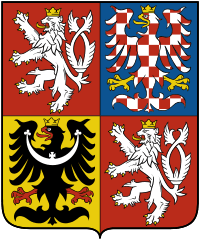#OurStories - Mental health teams for children and adolescents as the future of Czech education system?

Published
Primary schools in Kutná Hora region were part of the pilot project in the past two years. It brings a new perspective on the problematic behavior of children, on its causes and on how to deal with it successfully. It emphasizes the mental health of children and brings a team of experts to schools.
Two multidisciplinary mental health teams have been operating in the Kutná Hora region as part of the project since September 2021. One is at Zruč nad Sázavou elementary school, the other at Kamenná stezka elementary school in Kutná Hora. The topic of mental health is new to schools. And everyone – teachers, students and parents – are just learning to name their mental problems.
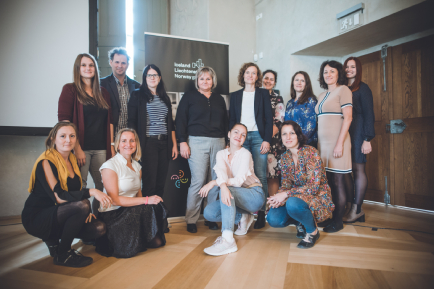
Joint photo of the Kutná Hora and Zruč mental health teams
The Pedagogical-Psychological Counseling Office is also a partner of the project (note: official institution of the Czech education system). I mainly had a major influence in spreading awareness about these teams at the beginning. Now there is no need for promotion. People and teachers know about them and go for help themselves. "Each of the teams has a consultation room in their home school, in addition they travel to other schools from the entire region," explains Ivana Stará, the principal of the Zruč primary school and the head of the entire project.
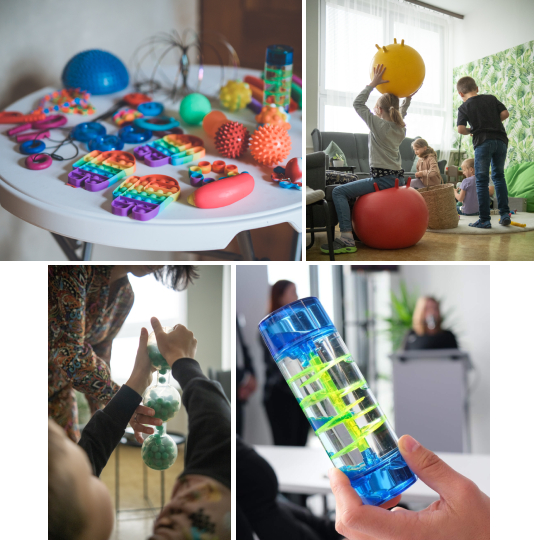
The therapy includes anti-stress aids and activities. A special room was thus created at both schools, where children can go to confide in or play.
Kids aren´t bastards after all
The project approaches the problematic behavior of children in an innovative way. And where does this behavior come from? "Teachers often tell us: ´He is naughty´. And we say: ´he is not naughty, he has some experience and on the basis of that experience he expresses himself like this´," Miloš Březina, a social worker from the Kurná Hora team, describes very simply the essence of the approach to children. The director of the same school, Andrea Melechová Ruthová, adds to the explanation: "A child who is naughty does not behave that way because he wants to, because he wants to make us angry. He's not doing it because he's a bastard, he's actually calling for help.” Mental health teams are bringing that help.
A stressed brain and a smile from Norway
The method of working with children is based on the so-called neurosequential model. It is based on the findings of neurobiology and, among other things, explains how traumatic experience and the level of stress are related to our actions. And that through problematic behavior the child is just reacting to something.
"A child who gets into some trouble (and is at risk for mental health) may appear to those around him as closed minded. But it has worse skill acquisition because his brain doesn't allow it in the given situation. The child may appear lazy, or it may seem that it has stopped going to school ´for no reason´," explains special education teacher Adéla Mikulová, explaining how the brain reacts. Other children behave aggressively under stress.
Members of both teams were trained in the neurosequential model at the Norwegian Psychiatric Center in Østbytunet, some in a course tailored for teaching staff, some in a therapy course. At the same time, they could learn how to work with problem children at the psychiatric clinic there.
„You may laugh, but I brought a smile with me from Norway," says Andrea Melechová Ruthová. “A smile is important and essential for everyone involved. If I smile, act welcoming, open and smiling, it works wonders. And it works for both children and colleagues," adds the school principal with a smile.
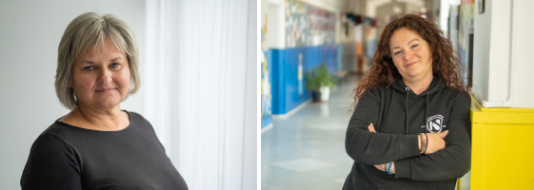
Principal of Primary School Zruč nad Sázavou Ivana stara and principal of Primary School Kamenná stezka, Kutná Hora, Andrea Melechová Ruthová
Let's put our heads together
A key feature of mental health teams is multidisciplinarity. Experts from different fields meet in one team: social worker, school special pedagogue, psychologist, child psychiatrist, nurse. "The added value is that these experts discuss with each other and look for the best way to support the one who seeks them. It can be anyone: a child, a teacher, or a parent who needs help with some of the issues of children's mental health," explains Ivana Stará.
Psychologist Barbora Hošková from the Kutná Hora team also praises the interdisciplinary nature of the teams: "The expert is not there on his own, but can consult with his colleagues. This is very important in terms of the range of services we can offer to families and children." All experts agree that together they dare to solve problems that they would not tackle alone.
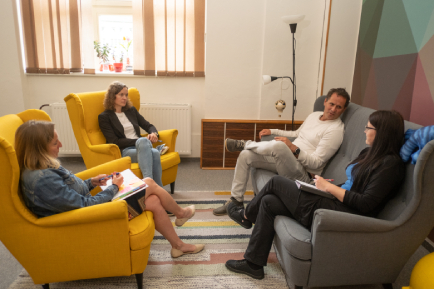
The mental health team at the consulting school Kamenná stezka in Kutná hora
Social workers working in the school are also a novelty introduced by the project. Their contribution is summarized by the director of the Zruč school, Ivana Stará: "The project clearly showed the irreplaceability of this role, because social workers are closest to the family, they know how find problems and support families. We don't need to know the child's family background in detail, but we do need to know that the child is in a difficult situation, which is why he is having trouble at school and learning"
All in one place and enthusiastic parents
In addition to children, teachers or parents often come to see specialists. And it is parents who are very enthusiastic about the work of mental health teams in schools. "I really like the approach to children, the approach to parents, and that everything is in one place. You don't need to see a psychologist, psychiatrist, psychotherapist - all this is provided by the mental health team. They are people my daughter trusts," Alena Vránová praises the project.
Tereza Kabelková, whose son needed help to somehow process the situation internally after his grandfather died, is again very glad that her son had a place to talk at this difficult time.
Petra Kociánová sought out a mental health team with two children, each time for a different reason – once because of unhealthy relationships at school and once because of stress before high school entrance exams.
"They helped us with empathy, trust, and we know we can come again. We felt the results immediately after the first meeting," says another mother, who is satisfied with the work of the Kutná Hora mental health team.
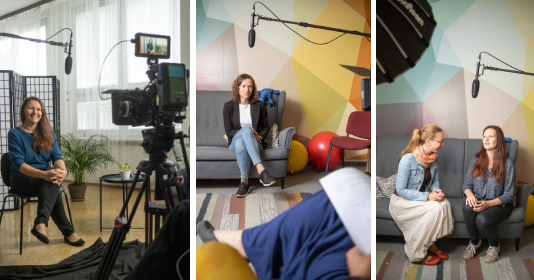
Special pedagogue of the Zruč team Iveta Holovská, psychologist of the Kutná Hora team Barbora Hošková and parents filming an interview about the project
"The project certainly makes sense. For example, bullying occurs in some form in all schools, it can lead to serious psychological problems, and just the knowledge that there is someone you can turn to is very important," the parents agree.
As nurse Jana Cabalková adds: "We taught the children to come to us. They need to talk or cuddle, sometimes they miss that in the family," she explains. She and her teammates already know which child is peeking around the team room so that they can confide later.
600 clients from around the cities of Zruč and Kutná Hora
Mental health teams are not only active in their home schools. Each of them has a car and thus manages to cover elementary schools or even families in the entire Kutná Hora region. During the two years of their operation, they served six hundred clients.
„"We realized that there was a big lack of support here in and aroun Zruč. And today I see children who, for some reason, would have been sent to a ´special school if they hadn't received our support, flourishing here at school," Hana Měkotová, the social worker of Zruč team describes.
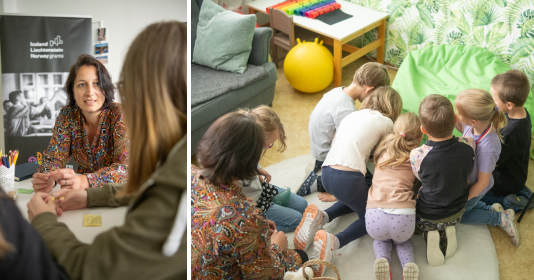
Hana Měkotová, social worker of the Zruč team, with children
Wellbeing as a new discipline in Czech education?
However, direct client care was not the only activity of the project. It was possible to introduce this method of working with children to the teaching staff in twenty schools in the Kutná Hora region.
"The issue of mental health and well-being among children and adolescents is relatively new, and it is very important that school management also supports these activities. And not only for children, but also for teachers," says Ivana Stará, principal of Zruč primary school. She holds the equation: satisfied teacher = satisfied student = satisfied parent. Mental health teams eventually worked in all schools in the region, even in those that initially did not feel the need for cooperation.
According to Barbora Hošková, it is essential that psychological problems cease to be a taboo: "Prevention in the field of mental health is important. It is great that part of it is the destigmatization of psychological problems. In schools, this view is not quite common, but in some of them it is successful," describes the school psychologist, who considers her mission in education to be key. "Czech education is focused too much on performance, but we have to take care of children in the field of mental health as well. It's important for them to be calm, that's the only way they can learn and develop their potential," she adds.
The director of ZŠ Kamenná stezka primary school with her: "It is no longer something that is taboo, mental health is coming to the forefront of interests and in teachers' assembly rooms," says Andrea Melechová Ruthová.
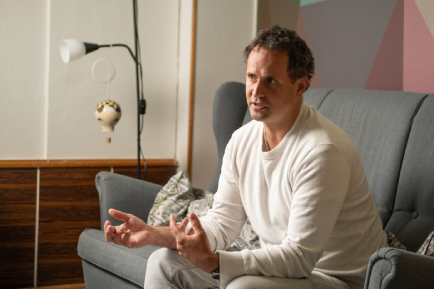
Miloš Březina from the Kutná Hora team explainin the essence of the neurosequential model
A mental health team for every school?
A two-year pilot project financed by the EEA Funds has reached its conclusion. The principals of both involved schools have a clear conclusion for their colleagues: "Ask your founders, or better, the Ministry of Education, to provide this care to all schools, all children, all teachers and parents throughout the Czech Republic." Negotiations at the Ministry of Education are already underway. If they go well, the teams could operate throughout the Czech Republic and thus become part of the Czech education system.
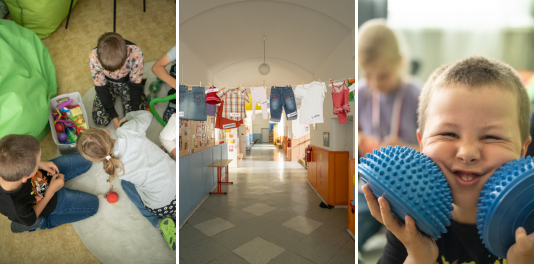
It is important for children to be in a friendly, calm and relaxed environment. This is the only way they can learn and develop their potential
O projektu:
Project Child and adolescent mental health team in Kutná Hora, municipality with extended competence: founding, pilot operation and multidisciplinary programme is implemented in the Health Programme and financed by EEA Grants.
More about EEA and Norway Grants
More about Health Programme
Project web: https://www.dusevnizdraviprodeti.cz
| Název projektu: | Child and adolescent mental health team in Kutná Hora, municipality with extended competence: founding, pilot operation and multidisciplinary programme |
|---|---|
| Realizátor projektu: | Zruč nad Sázavou Primary School |
| Partneři projektu: |
Ostbytunet Center for Treatment and Professional Development in Child Psychiatry (Norway) Pedagogical-Psychological Counseling Office, Central Bohemia |
| Program: | Health |
| Grant: | 14 906 000 CZK |
| Aim of the project: |
To support the psychological health and well-being of children and adolescents in the area of Kutná Hora region, thereby improving access to relevant services in the area. Establishment and two-year operation of a MENTAL HEALTH FOR CHILDREN AND ADOLESCENT team with multidisciplinary scope among providers of specific services (schools and school counseling, social work, healthcare, etc.). This model fully corresponds to the strategy of psychiatric care reform in the Czech Republic. |
